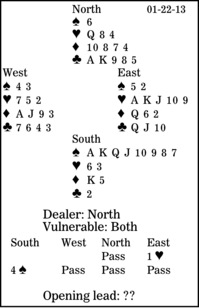Bridge column, January 22: Tricks, not laughs, from high and low

This week we are looking at the defensive principle that if you lead a low card from length, you guarantee at least one honor in that suit. With a weak suit, you lead an unnecessarily high card. This is no laughing matter, but there is one situation when the rule should be ignored -- when you are leading partner's suit and you have not supported that suit. Then, giving length information is (usually) more important than strength information.
This deal is a textbook example. North passes as dealer, East opens one heart, and South leaps majestically to four spades.
If West leads the heart seven (top of nothing), East will think it is a singleton or high from a doubleton. He will win the first trick with the heart nine (low from touching cards when playing third hand high), take the heart ace, and try to cash the heart king. But South will ruff and run all of his trumps. There is no minor-suit squeeze, but declarer takes eight spades and two clubs.
Instead, West should lead the heart two, low from length in partner's unsupported suit. Then East, after taking two tricks in the suit, will know that West has the one extant heart. East will shift to the diamond two (low from an honor) and the defenders will take two tricks in that suit for down one.
** ** **
COPYRIGHT: 2013, UNITED FEATURE SYNDICATE
DISTRIBUTED BY UNIVERSAL UCLICK FOR UFS

